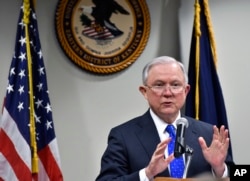A bipartisan group of U.S. lawmakers on Thursday unveiled new legislation that would allow states to choose their own marijuana laws, despite a 48-year-old federal prohibition on cannabis.
While the bill would not lift the ban, it seeks to amend the Controlled Substances Act of 1970, exempting the production, possession and distribution of marijuana in states where it's legal.
The bill's sponsors cast it in terms of states' rights, saying the legislation ensures that "each state has the right to determine for itself the best approach to marijuana within its borders."
"The federal government is closing its eyes and plugging its ears while 46 states have acted," said Republican Senator Cory Gardner of Colorado, the first state in the nation to legalize recreational marijuana. "The bipartisan, commonsense bill ensures the federal government will respect the will of the voters — whether that is legalization or prohibition — and not interfere in any states' legal marijuana industry."
Federal cannabis laws
Democratic Senator Elizabeth Warren of Massachusetts, another state that allows recreational marijuana use, said federal cannabis laws "have perpetuated our broken criminal justice system, created barriers to research, and hindered economic development."
"States like Massachusetts have put a lot of work into implementing commonsense marijuana regulations — and they have the right to enforce their own marijuana policies," she said. "The federal government needs to get out of the business of outlawing marijuana."
The impetus for the legislation was a decision by Attorney General Jeff Sessions in January to rescind Obama-era Justice Department guidelines that encouraged prosecutors to adopt a hands-off approach to marijuana law enforcement in states where the substance was legal.
Instead, Sessions directed U.S. attorneys general around the country to "enforce the laws enacted by Congress and to follow well-established principles when pursuing prosecutions related to marijuana activities."
The decision proved controversial. While several leading law enforcement associations backed the move, it was excoriated by marijuana advocates, civil libertarians and states with pro-marijuana measures. Shares of publicly traded marijuana companies plummeted.
Leading the charge against the decision was Gardner, who blocked key Justice Department nominees who require Senate confirmation, triggering a standoff with the White House.
But he later backed off after reportedly receiving reassurances from President Donald Trump that the Justice Department would not interfere in the Colorado's billion-dollar marijuana industry.
Speaking to reporters, Gardner said he's spoken to Trump about the proposed legislation and that the president supports a "states' rights approach" to resolving the conflict between federal and state laws on marijuana.
The White House has not commented on the legislation.
A Justice Department spokesperson did not respond to requests for comment.
Legal in many states
While prohibited by federal law, marijuana has gained social acceptance in recent years, leading a growing number of states to legalize it in one form or another. Twenty-nine states allow for medical use, while eight states plus the District of Columbia allow its recreational use.
Public support for marijuana legalization has also grown in recent years. A 2017 Gallup poll showed 64 percent of Americans supported legalization, the highest level of support it has recorded in almost half a century.
The Gardner-Warren bill represents the latest congressional attempt to support the marijuana industry in the face of a federal ban. Last year, more than a dozen stand-alone bills were introduced that aimed to change the federal government's approach to marijuana. However, efforts to remove marijuana from the federal list of controlled substances have failed.
While the latest legislation has been endorsed by trade groups and civil liberties advocates, it faces uncertain odds.
Emily Burns, a marijuana law policy expert, said the bill fails to address a plethora of legal issues presented by conflicting federal and state marijuana laws. For example, banks won't be able to serve marijuana businesses even if the bill were to pass, she said.
In addition, the legislation is unlikely to pass constitutional muster, she said.
"If federal government allows each state to pass laws regulating an industry that implicates interstate commerce, the legislation violates the commerce clause of the U.S. Constitution," she said.
In 2005, the Supreme Court held that the federal government's power to regulate interstate commerce applied to marijuana.






